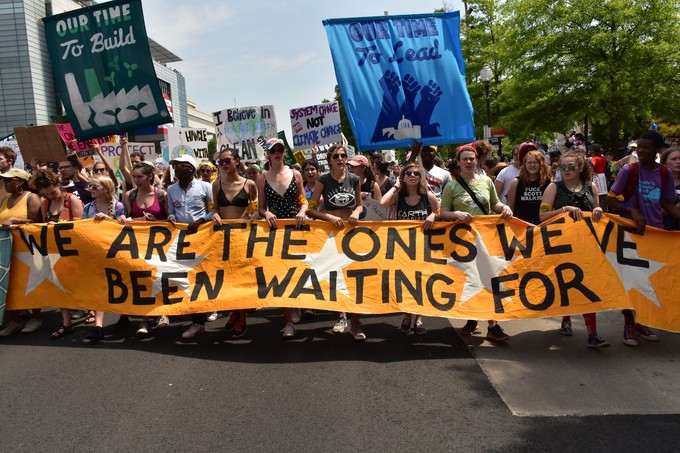Organizing and Mutual Aid are the Answers to a “Peace” Climate Summit that Was Anything But
By
Guest Blogger
Posted:
|
Climate Change,
Military & Security
by Aspen Coriz-Romero

Photo courtesy of Amaury Laporte
Militarism and fossil fuel dependency are inextricably linked– yet world leaders ignored this reality when they gathered to hash out global climate goals at the so-called ‘peace’ COP. When world leaders drop the ball this badly, it’s up to us to lead the way forward.
Despite repeated calls from representatives of the Global South and frontline communities, negotiators at the international COP29 climate meeting in late November blatantly failed to confront the relationship between expanding military violence and catastrophic climate breakdown.
The connections couldn’t be clearer as the US– the largest historical driver of global warming– has the biggest military budget and spends $81 billion annually ‘defending’ global oil supplies. While living conditions for the working-class continue to worsen, over two-thirds of the discretionary federal budget goes to militarized programs.
Bloated investments in militarism come at the price of under-investing in other urgent needs– including climate. Over the last decade, US contributions to the Green Climate Fund, a primary international fund for initiatives in the most climate-vulnerable countries, totaled $2 billion– while 40 times more funding went to foreign countries to finance the purchase of U.S.-made weapons.
Just as world leaders failed to make use of COP29 to address the role of war and conflict in climate change, they also failed to make meaningful progress on funding an international loss and damage fund, or ending the use of fossil fuels.
With the return of Donald Trump– a vocal climate change denier with a ‘drill, baby drill’ attitude and an “America First” tagline – the landscape looks even more alarming. During his first tenure the president-elect withdrew from the Paris Agreement and slashed federal contributions to climate initiatives– calling the crisis “a total, and very expensive hoax”.
It’s no hoax– we’re pushing the limits of safe existence on Earth, and we’re already paying a huge price. From 2000 to 2019, extreme weather events worsened by climate change were linked to at least 60,951 deaths - and likely many more, since data is sparse for events like heat waves in Africa. Globally, costs during this period were an estimated $16.3 million an hour.
Policy priorities need to be drastically transformed– but as we learned from the hapless COP29, the change we need will not be driven from above. Regardless of who is in office, the people must continue to demand sufficient climate action– there is no time to waste. We must call on our state and local leaders to defend existing climate regulations and investments in our communities. We can’t shun these steps as too small. As bad as things are, scientists tell us that every tenth of a degree of warming matters.
Beyond applying pressure onto policymakers, it is vital to engage in grassroots organizing. As we enter precarious times, now is the moment to get involved in climate groups and care networks. Governments may fail to adequately respond to the needs of the people, but we can collectively work to meet each other’s needs through solidarity and mutual aid. Many communities already are.
Joining together is the first step. When I was 17, I joined a local youth-led climate organization because I wanted to fight for environmental justice in my home state of New Mexico– which has the only ‘cradle-to-grave’ nuclear industry and is the second largest producer of crude oil in the US. That experience was when I first realized the immense threat climate change posed to my generation and those that followed. I couldn’t help but think: What kind of future could I have in a world devastated by climate catastrophe? What would happen to my 7-year-old brother? What if the place we called home became uninhabitable?
Now, at 23, I find myself asking the same questions as we veer ever closer to crossing planetary thresholds. As 2024 (the warmest year on record) comes to an end, those questions only grow more insistent.
I don’t have all the answers, but I refuse to give into despair. A livable planet and peaceful world are not up for debate– they’re imperatives.
Aspen Coriz-Romero is the New Mexico Fellow at the Institute for Policy Studies.